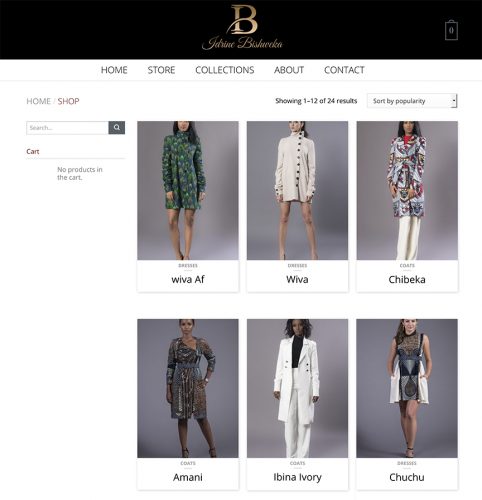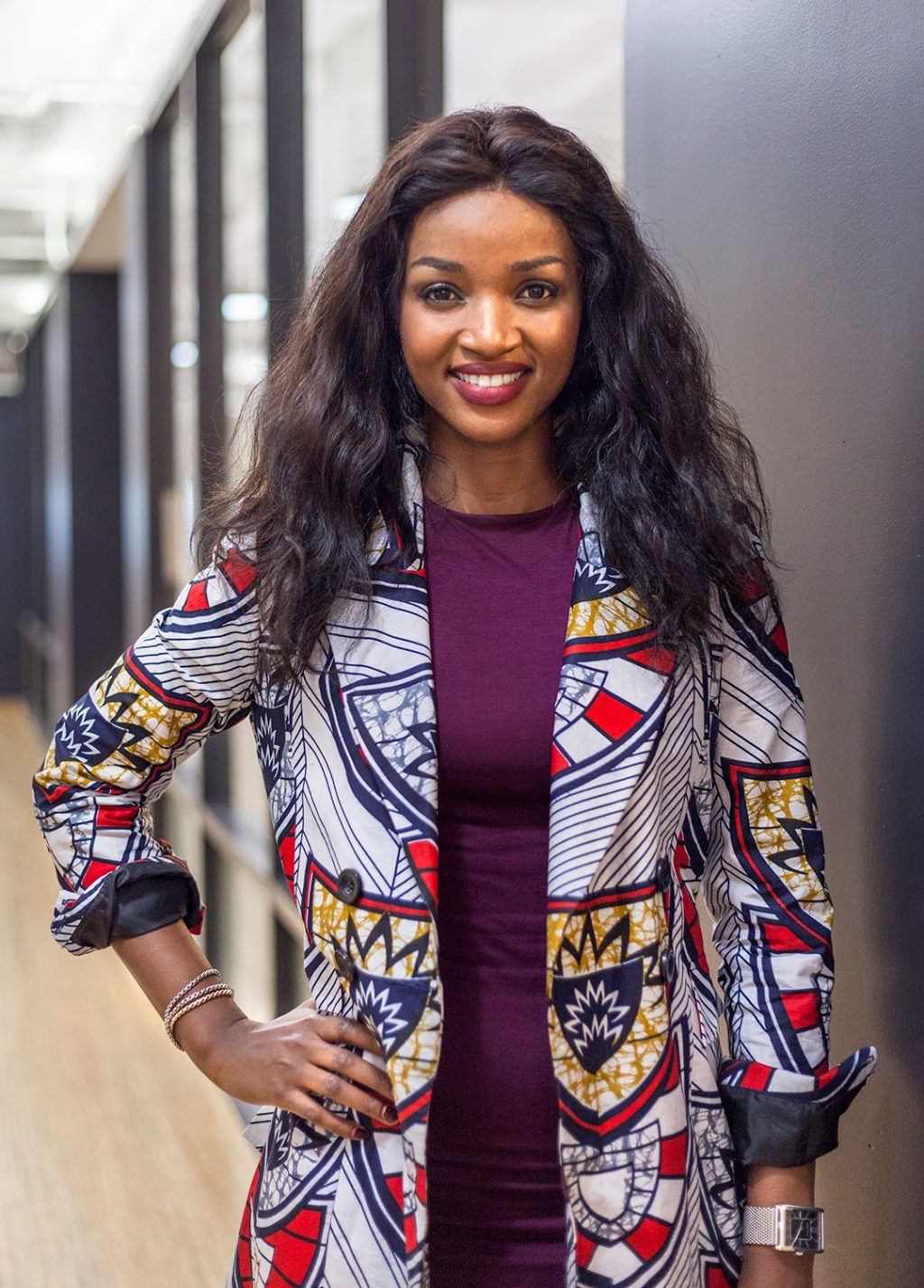
INTERVIEW WITH A PROFESSIONAL – Idrine Bishweka – Fashion Designer
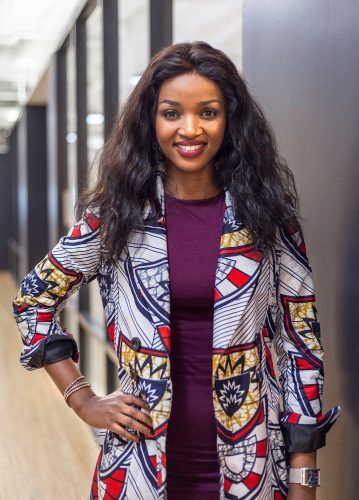 Idrine Bishweka is a designer from Goma, DR Congo. Based in Chicago, she designs refined Western and African-printed pieces that meet the needs of today’s women by combining fashion with versatility and femininity.
Idrine Bishweka is a designer from Goma, DR Congo. Based in Chicago, she designs refined Western and African-printed pieces that meet the needs of today’s women by combining fashion with versatility and femininity.
To provide such mixture in each of her pieces, Idrine draws inspiration from different cultural senses of beauty from around the world.
She uses tribal and modern luxurious fabrics from countries such as Kenya, Holland, Canada, and Italy. In her previous collections, Idrine has presented her clothing to various fashion shows, showcases, and fashion projects such as: Stylechicago.com’s 15th season of Fashionchicago Shopping Party, The Black Women’s Expo, the African Fashion Show Chicago, Broadway to Runway, the word Enigma Present Power (international student power exhibition), and Global Harmony (across-culture student performance art showcase).
The “In The Loop” staff caught up with Idrine at her downtown office, where she answered questions about her experience with the fashion industry.
IN THE LOOP: What type of personal traits does someone need to succeed in this line of work?
IDRINE BISHWEKA: For fashion, you need to be creative and create something original. I think it’s good to know the trend but go behind the trend, bring something new, something original. Take the risk to create something new, to make people love something new. I think you need to be unique and also have good communication skills. When you work with a photographer, seamstress, or a customer, it is always good to be open.
ITL: Do you find compromise an important aspect of your industry in creating pieces, or can you make anything anyway you want?
IB: We have to compromise because I don’t design for myself, I design for people. I design things that I love and I have my inspirations. I can say I can be inspired by African culture, by African shape or color, while I still design for American people. I have to combine those two cultures and see how people like it.
ITL: How would you describe your customer base?
IB: Working women. When I started, and while writing my business plan, my business model, I was thinking about women 20 to 30, but I am very surprised to also have women of 50 and 60 interested as well. So I’ll say it’s 25 to 40, and sometimes it goes above.
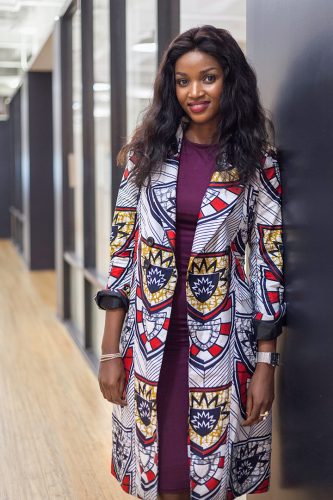 ITL: How would you describe your overall style?
ITL: How would you describe your overall style?
IB: I would say sexy and feminine, but at the same time I consider it to be modern and conservative. Something that is sexy, but not too revealing.
The perception of beauty in my culture and different cultures around the world is what inspires me. I use African objects, color, and culture to create a piece. After designing it, when I want to make the sample, I try to use Western culture to make it more practical.
ITL: What age did you learn that you liked fashion?
IB: When I was young, I used to make little toys and scarves for my doll. When my mom would go to see her seamstress, I always asked her to bring back the scraps or left over fabric. It’s very common in Congo to design your own piece and bring it to the tailor so they can make it.
ITL: What was your experience growing up in Africa?
IB: I grew up in Goma, which has been known as one of the most dangerous cities in the world.
When I asked my dad to go and work and study in Kenya, he was ready to give me that permission. In terms of the job, where I lived, it was very challenging, because I lived in the war.
Sometimes there would be a problem and we would have to interrupt school and run to Rwanda. We would have to go to Rwanda for some weeks until the city would be safe to return to.
ITL: When you were growing up did you always have dreams of working in the fashion industry?
IB: When I was 18, I had high expectations in money. I decided to move to Kenya to learn finance and accounting. I was thinking about being an accountant or about working in a bank. In finance, they always teach you to take a higher risk to make a higher return. That was always very interesting to me.
ITL: You have a degree in finance already?
IB: Yes, from the Catholic University of Eastern Africa. After my graduation, I felt like I was not complete. I decided to start taking fashion classes because I couldn’t start my company, my fashion line, without having skill or classes in fashion design.
It was very helpful to know finance. You need a market, you need to to manage your funds, you need to know how to divide, like this is gonna be for production, this is gonna be for marketing. So having financial skills helps. It helped me to have that confidence again, to take a risk.
Everything counts, every button, every fabric. counts everything and make the price for my garment so it’s it’s really helpful.
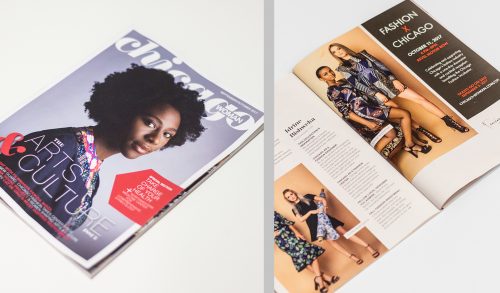
ITL: What was it like being from a finance background and then taking classes in fashion at Columbia?
IB: When I started at Columbia, I already had my business plan. My first collection I showcased in school. I made about 15 pieces and everyone thought I was doing a thesis.
ITL: Did your classmates have to make 15 pieces?
IB: No. They had to make one dress. Everyone was always asking me why are you in the fashion lab all the time? I just love making stuff. I enjoyed it, it was just me.
ITL: Did the knowledge you learned help prepare you for where you are now?
IB: The process is all the same that I learned in school. Everything that they told me in school is everything I used. How the teachers start by the mood board, I use the same process. Inspiration, mood board, then create a shape, then make a sample out of it, then patterns. I do follow everything, all of the processes that I learned. I still use my book and I go back to my notes.
I graduated with a lot of friends and I had a lot of connections with teachers, which helped me when I started my business.
When I stated working in the fashion industry, when I opened my place here, it was very difficult at the beginning. I’m like, “If I survived the world, I can survive the American market! You know?”
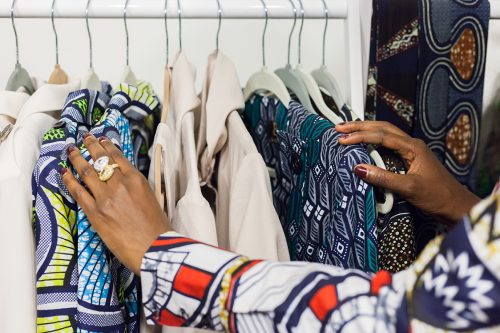 ITL: Any advice for students who are currently taking classes?
ITL: Any advice for students who are currently taking classes?
IB: When I was in school, most of the time students would choose teachers who are very easy. They’ll choose a teacher who doesn’t give them pressure. I didn’t do that, maybe because I was from a finance background.
I was looking for teachers who people were saying were tough. I wanted a challenge so I didn’t choose a teacher for the credit I was going to get. I chose for the knowledge. It’s knowledge you can use after you graduate.
ITL: What advice would you give to someone who wants to follow in your footsteps?
IB: From my experience it’s very important to follow your dreams. Don’t be scared to take risks.
When you’re scared to take risks, it won’t be helpful to you in the future. If you say I’ll try tomorrow, and tomorrow you say the same thing, and tomorrow again, you just make everything take longer. All of us learn through our mistakes.
Follow your dreams. Five years ago, I didn’t consider to make fashion my profession. I was just thinking that I would be working in finance or working in a bank. It’s always good to work in a field that you enjoy. I do work hard, but at the same time I enjoy it, and when you enjoy it you don’t feel like it is work. It is hard and challenging, but at the end of the day, you are happy and you enjoy it.
The Fall Collection can be viewed at…
